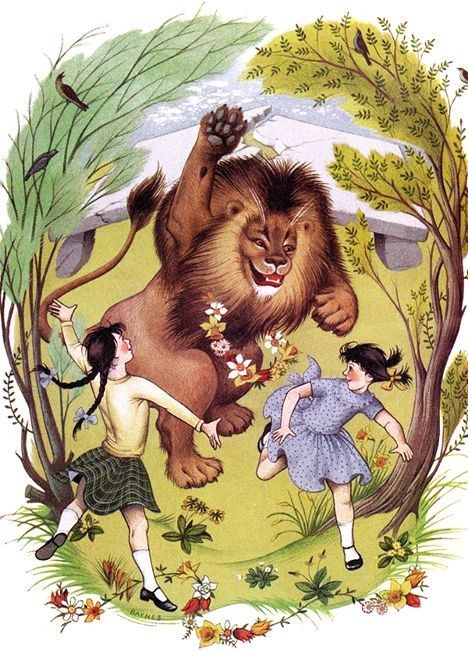A playful romp with God
Growing up, I never heard a word about God laughing, joking, or doing anything for fun.

Every few years, I return like a wanderer coming home to a scene in C. S. Lewis’s The Lion, the Witch, and the Wardrobe. Aslan has just come back to life after being killed by the wicked White Witch. Although the majestic lion’s resurrection foreshadows the novel’s happy ending, the land of Narnia is in immediate peril. War is ravaging the land, Aslan's faithful followers are dying, and the White Witch is gleefully certain that she has triumphed over her enemy. It is a dire moment.
And at this dire moment, Aslan takes a break from the solemn business of world-saving to play a rousing game of tag. “Oh children,” he shouts to the kids who have witnessed his resurrection, “I feel my strength coming back to me. Oh children, catch me if you can!” And off he goes, leading them on an exhilarating, joy-filled chase through the hills until they finally collapse “in a happy laughing heap of fur and arms and legs.” “It was such a romp,” Lewis writes, “as no one had ever had except in Narnia.”
The first time I encountered this scene—as an adult, reading the Narnia books to my own kids—I cried. The possibility that God might laugh, romp, and play with his children stopped me in my tracks. How could such a scandalous thing be true?
Growing up, I never heard a word about God laughing, joking, or doing anything for fun. No one invited me to imagine the Jesus of the Gospels smiling, much less goofing around with his disciples, playing hide-and-seek with the children who flocked to him, or basking in the sunshine on a gorgeous summer day. The list of characteristics I associated with God—omniscience, holiness, transcendence, righteousness—did not include playfulness. It did not include an affinity for tag.
Yet play is a fundamental part of human childhood, and it features elsewhere in creation as well. Many wild animals play—even though it burns up their energy for survival without providing food, shelter, or safety. Why would evolution favor such a useless activity?
The Bible is chock-full of references to play, too. The book of Proverbs describes Lady Wisdom playing with God in the act of creation: “I was his delight day by day, playing before him all the while, playing on the surface of his earth; and I found delight in the sons of men” (8:30–31, NAB). Psalm 104 describes the sea creatures God made specifically to play with. What if not playfulness characterizes God’s instruction to Abraham to name his son Isaac, meaning “let him laugh”? And how can Jesus exhort his disciples to become like children if he doesn’t value play?
My first encounter with Aslan’s romp in the hills was a revelation. It opened up the possibility of a wilder, roomier, and more beautiful God—a God who knows how to have fun, who isn’t afraid of pleasure. A God who takes seriously the business of play and invites me—a creature made in God’s image—to reflect that playfulness back.
But what does spiritual playfulness look like? I think it looks like deep attentiveness: a willingness to gaze, attend to detail, and enjoy rather than to use, abuse, or consume. It looks like collaboration and fairness, a mutual commitment to the pleasure of all involved in the game.
And it involves a steadfast and creative refusal to default to boredom, cynicism, ennui, and contempt. In Orthodoxy, G. K. Chesterton describes this refusal as God might practice it:
Because children have abounding vitality, because they are in spirit fierce and free, therefore they want things repeated and unchanged. They always say, “Do it again,” and the adult does it again until he is nearly dead. For grown-up people are not strong enough to exult in monotony. But perhaps God is strong enough to exult in monotony. It is possible that God says every morning, “Do it again,” to the sun; and every evening, “Do it again,” to the moon. It may not be automatic necessity that makes all daisies alike; it may be that God makes every daisy separately, but has never got tired of making them. It may be that he has the eternal appetite of infancy.
I love the possibility that God delights in each sunrise, each daisy, each individual act of creation and recreation. I love the possibility that I might approach life in the same way, finding even in repetition and sameness infinite opportunities for joy, creativity, and pleasure. I wonder how my approach to life would change if I no longer needed to “kill” time but instead learned to bask in it.
I’m not particularly keen on New Year’s resolutions. But as I start 2019 and face a world like Aslan’s—a world in peril and need, desperate for hope and justice—I’m drawn to the power of play as an antidote to despair. To play is to trust, to resist anxiety. It is to believe that the ending will be a happy one and to bravely cocreate that ending with God. Sara Maitland writes in A Big-Enough God that “every old-fashioned sin list” should include the failure to have fun. That would completely change the way I practice my faith.
A few years ago, a friend who knows how much I love the Aslan story sent me a small stuffed lion. She tied a note around his neck: “May you always know a God who romps with you.” I hope I will.
A version of this article appears in the print edition under the title “A God who plays.”





